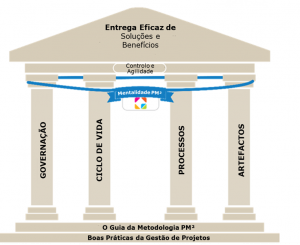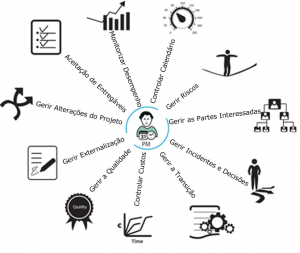When and where did you first hear about PM²?
I first heard about PM² when I got to know about the coming 2018 Open PM² Conference in Brussels. A colleague of mine was participating, we talked about it, and I asked him to collect as much information on the methodology as possible, because I was very interested in knowing more about it.

As a result of his participation in the Conference, the idea of translating the Open PM² Overview Guide to Portuguese emerged as a challenge, an exciting opportunity for me to immediately dive into it and get to know it better.
What do you like about PM² and why do you think it is important to have it translated into your language?
I like its simple coherence, the clear governance model, its complete set of artefacts, the overall focus on project benefits to business, the mindsets foundation for project team’s attitude.
Simple, yet useful things are extremely hard to build. But PM² presented a complete set of project management principles, written in simple and straight language, easy to follow even for a beginner in project management. Let’s face it, managing projects is hard, it requires many skills and competences and a very sharp and focused attention to details, while maintaining a global vision of the project. PM² clearly states that it’s not all about the project manager, it’s a team job, and it simplifies the bureaucratic load of the job, focusing on the essentials, with clear roles and responsibilities. It makes sense, in its simplicity.
Translating into Portuguese was a twofold job: getting to know PM² and leaving a first contribution to the open ecosystem surrounding the methodology, by simplifying its access to the Portuguese community.
How difficult was it to find qualified volunteers for the translation?
 As a matter of fact, I haven’t done any real effort in getting the team. A quick chat with some friends was enough to assure the work would be done. We didn’t want the burden of a large team coordination, so we divided the work among us, everyone did their part and I have put the things together, for a brief coordination. Everything came out very easily.
As a matter of fact, I haven’t done any real effort in getting the team. A quick chat with some friends was enough to assure the work would be done. We didn’t want the burden of a large team coordination, so we divided the work among us, everyone did their part and I have put the things together, for a brief coordination. Everything came out very easily.
We relied on the Portuguese Standard for Project Management vocabulary, for global terminology, but some translation decisions came out of its scope. In Portugal, some original English terms and expressions are so commonly used in the PM community (Steering Committee, for example), that the simple adoption of a Portuguese word would certainly fail, for lack of consensus among the overall community. As we wanted to make a complete translation, this stood for a risk, but risks come with all projects. In the final work, in some not so consensual translated terms, we decided to keep a reference to the original expression, so that the Portuguese translation could be clearly understood in context.
When did you start the translation and how long did it take?
At the time we were doing the translation, in the middle of 2018, I could take all my free time to do it, so things went very smoothly. With this small engaged team, we have been able to do the job in only a couple of months, using our spare time.
What do you think is the future of PM²?
As a consequence of being introduced to PM², I became deeply involved with PM² and PM² Alliance. I foresee a great future for PM², as a result of its simplicity, its completeness, and the fact that so many volunteer-based work has been and is being done in so many European countries. This is an open methodology, built on the needs of a large community of people dealing with so very different projects, as simple and agile as project management can be.
I believe that the conditions are there to turn PM² into a standard Project Management Methodology around Europe, but also a global tool for anyone wanting to apply best practices and nice simple tools to better manage their projects and teams.
I am ready to start a new journey around PM² and PM² Alliance, and will do my best to spread the knowledge about PM² and bring more and more people to use it as the management tool for their projects.








